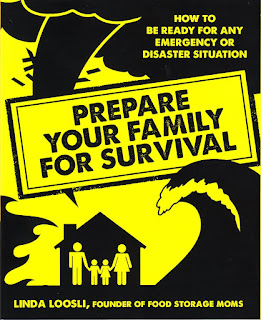Preparing for an emergencies, what some people call "prepping" has been laughed at for decades. It brings to mind images of crazy people putting bunkers in their back yards and sitting on hundreds of boxes of army rations.
However.....
What about preparing for real life emergencies that could really happen? Floods, hurricanes, tornadoes and even terrorist attacks or rioting. Any of them could really happen, but the most likely to happen is prolonged power outage. The grid could go down for many reasons, and stay down for days or even weeks. Would you be prepared if that happened?
What is Emergency Preparedness?
Emergency Preparedness is planning for an unexpected, serious occurrence that could pose a threat to the health and wellbeing of you and your family. It can be something as dangerous as a gas explosion, to something less dangerous, but still devastating, like a flood or a serious problem with your electrical supply.
How Can Planning Help?
Emergency planning helps to reduce the amount damage an emergency does to your life, the lives of your family and your property. If the incident is catastrophic, planning can actually save your life. In an emergency, people are scared, confused and in a panic about what to do and how to take care of themselves and their loved ones. If you are prepared, it will significantly reduce your fear because you know you have a plan and the items you need to make sure you are safe and cared for during a bad situation.
How Can I Know What Kind of Emergency to Prepare For?
The simple answer is: you can't. You have no way of knowing what will happen, so the best thing to do is to take care of the basics that you need in any emergency situation.
- Food - Have some food that you can eat without having to cook it, even better if it does not have to be refrigerated. Peanut butter, crackers, beef jerky, protein or granola bars, honey, cookies and things like this are easy to store and will keep you going if you are in a situation where you have no electricity and can't cook. It is always safer to have your own food available when a bad incident occurs so you don't have to go out, which in an emergency can be dangerous. Keep your emergency food in totes in a cool dry place and don't forget to switch it out for fresh a few times a year so it does not go out of date.
- Water - Water is something most people take for granted as always being available, and therefore it is not necessary to store it. This is not true. Your water supply may become contaminated or your local water treatment facility could break down and stop supplying water. The best way to be prepared for this situation is to store some water. You can buy cases of bottled water, or 5 gallon plastic jugs that are available in most big box stores. Having clean water to drink and wash yourself with is one of the most important things in an emegency. Never take water for granted, it can be the difference between life and death.
- Shelter - The other part of having shelter is having a way to keep warm, should something happen in the winter. Your house is normally excellent shelter, but if you lose the ability to heat it, it can be nothing but a giant refrigerator. If this happens, find one room that is small and can be closed off and get a propane heater like Mr. Heater that is safe to use inside the house. Bring in blankets and warm clothes and stay in that room to keep warm. If you have a situation where you are forced to leave your house, such as a fire, flood or earthquake, you need to have a tent or tents to stay in outside, along with clothing, food and water to take with you.
- Flashlights and batteries
- First Aid Kit
- Candles and the means to light them
- Power Bank Charger to charge your cell phone
- Knife
- Aspirin
- Garbage Bags
- Sleeping Bags or Blankets
- Heavy Socks and Hats for all family members
- Firewood (if you are able to build a fire outside where you live)
- Some type of weapon to defend yourself
Last Thoughts on Emergency Preparedness
These ideas are just the very basics you will need for a short term emergency, for longer term situations the list of what you would need would be much longer. The above mentioned items are minimum of what every household should have in case of an emergency. Having these items on hand will make you feel calmer, safer and better prepared should the worst happen. Pick up a few items a week until you have what you need and as they say about being prepared for anything:
It is better to have it and not need it, than need it and not have it!
































